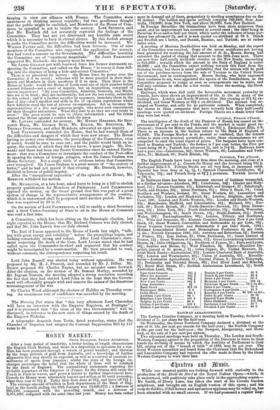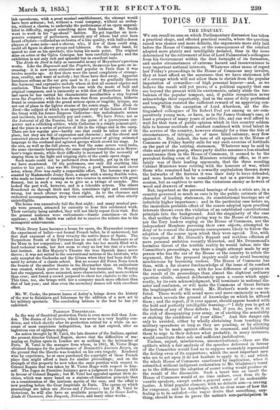'antra Ad Sum.
While our musical public are looking forward with curiosity to the production of the Etoile du Nord at the Royal Italian Opera—which, it is understood, will positively take place early in the approaching season— Mr. Smith, of Drury Lane, has taken the start of his Covent Garden neighbour, and brought out an English version of this opera ; and his coup de theatre, if full houses and uproarious applause may be relied on, has been attended with no small success. If we had possessed a regular Eng-
fish operahouse, with a great musical establiAmant, the attempt would have been arduous ; but, without a vocal company, without an orches- tra, without a chorus, to undertake the performance of an opera unparal- leled in difficulty, argued something more than boldness. Mr. Smith went to work in his "go-ahead" fashion. He got together an inex- pensive company of performers, scarcely any of whom had ever been heard ofbefore—collectedan orchestra of a like quality, with half-a-dozen players of some note—and a chorus, who, if few of them could sing, could all figure in showy groups and tableaux. On the other hand, he spared no cost on his spectacle, this being his main point. The original miss en scene at the Opera Comique has been carefully copied ; and the exhibition is not only rich and splendid bat in excellent taste. The Etoile du Nord is fully as successful as any of Meyerbeer's previous works. Like the Huguenots and the Pn9phite, its success has gone on in- creasing : it is now more attractive and popular in Paris than it was twelve months ago. At first there were the usual complaints of strange- ness, crudity, and want of melody ; but these have died away. Apparent harshness softens as the ear gets used to it ; and we gradually discern fine harmony and expressive melody where at first all seemed caprice and confusion. This has always been the case with the music of bold and original composers, and is eminently so with that of Meyerbeer. In this last opera be has carried his characteristic peculiarities a step beyond even the Prophets; while he has shown that those peculiarities, hitherto found in connexion with the grand serious opera or tragedie lyrique, are not out of place in the lighter strains of the comic stage. The Etoile du Nord—the subject of which is an apocryphal story of the liaison of Peter the Great with his future Empress Catherine—has melodramatic scenes and incidents, but is essentially gay and comic. We have Peter, not as the Autocrat of all the Russias, but in the guise of a journeyman car- penter and a rollicking soldier, while Catherine is a simple peasant-girl; and the piece is a series of pictures of life in the village and in the camp. There are few regular airs—hardly one that could be taken out of its place, but they are full of expression and character ; and the choral and concerted pieces show Meyerbeer's unrivalled power of giving animated language to the confused and agitated groups which crowd his stage. In the airs, as well as the full pieces, we find the same severe vocal tasks, the same chromatic harmonies, the same singular transitions, as in Meyer- beer's tragic music, while their difficulty is increased by the necessity of singing them in the light and tripping style of the comic opera stage.
Such music could not be performed even decently, got up in the way we have mentioned. Of the performers, one only did anything like justice to his part ; that was Mr. Drayton, a good musician and clever actor, whose Peter was really a respectable effort. The heroine was per- sonated by Mademoialle Jenny Baur, a singer with a strong flexible voice, who made no bones of running down two octaves in semitones with great fluency, but in such a way as to give us a twinge of earache. She looked the part well, however, and is a tolerable actress. The others floundered on through thick and thin, sometimes right and sometimes wrong, but much oftener wrong than right. As to the choruses and orchestral accompaniments, they were confused, noisy, and often utterly unintelligible.
The house was excessively full the first night ; and many musical peo- ple were present, attracted by curiosity to hear this celebrated work. Their curiosity being satisfied, they will not likely repeat their visit. But the general audience were enthusiastic—frantic sometimes—in their applause ; and Mr. Smith was called for to.receive the tribute due to his managerial achievements.



























 Previous page
Previous page